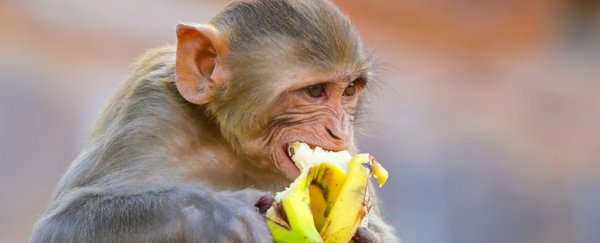Rhesus monkeys that eat a calorie-restricted diet live several years longer - and remain healthier - than their peers that eat as much as they want, two studies have concluded.
The result is a big deal, because these two, long-running studies have produced conflicting results for decades, leading to a heated debate over the longevity benefits of calorie restriction. Now, the two competing teams have worked together, and after nearly 30 years of research, have reached a consensus.
If you've studied biology, you've probably heard it thrown around a lot that restricting calories can help animals live up to 40 percent longer.
But many of these studies have been done on mice, flies, and yeast, so the results aren't directly applicable to humans. Still, many people out there choose to follow a fasting or calorie-restricted diet all the same, hoping it will help them live longer.
To get more insight into what was going on, in the late 1980s, two teams in the US set up long-term experiments with rhesus macaque monkeys, which share around 93 percent of our genome, and age in a pretty similar way to us, getting grey hair, going bald, and experiencing cognitive decline.
The two experiments were based at the University of Wisconsin-Madison (UW-Madison), and the US National Institute on Ageing (NIA) in Maryland.
Both teams have been running their experiments for almost 30 years now - with several of the monkeys still alive above the age of 40 (the average lifespan for a rhesus macaque is around 26 years in captivity). Together, they've gathered data from almost 200 monkeys.
The problem is that, for several years, the teams have been producing conflicting results.
In 2009, the UW-Madison team reported that monkeys fed a calorie-restricted diet lived longer than monkeys that ate normally, and the dieting monkeys also had less incidents of cancer, cardiovascular disease, and insulin resistance - which is a precursor of type 2 diabetes.
But in 2012, the NIA published results showing no difference in survival between their calorie-restricted monkeys and the ones that ate normally, although the dieters were slightly healthier.
"These conflicting outcomes had cast a shadow of doubt on the translatability of the caloric-restriction paradigm as a means to understand ageing and what creates age-related disease vulnerability," said one of the researchers from UW-Madison, Rozalyn Anderson.
Now, for the first time, those two teams have decided to work together. And they've just published a brand new paper that looks over both their data in detail to figure out why they might have different results, and what they can learn from the combined research.
The results, published in Nature Communications, found that:
- The animals in the two studies had their diets restricted at different ages - it turns out calorie restriction is more beneficial in adult and older primates than younger ones.
- The monkeys in the control group at the NIA ate less than the UW-Madison control group, which made the difference between dieters and non-dieters less pronounced.
- The diet composition was substantially different across the two studies. The NIA monkeys ate naturally sourced foods, while the UW-Madison monkeys at processed foods with higher sugar content.
- The two groups were from different genetic stock - the NIA monkeys were Chinese and Indian, while the UW-Madison monkeys were from India.
- Female monkeys seemed to be less at risk from high levels of body fat, and benefitted from calorie restriction less than males.
- The UW-Madison monkeys were also fatter overall.
So what can we take from all of this?
The overarching message from both teams is that calorie-restriction in monkeys can make them live longer and healthier lives - up to three years longer, to be precise - but it depends on what they eat, the age they start calorie restriction, and their sex.
The fact that the two teams now agree on this outcome suggests that it's more likely the results will have applications for human health.
"Taken together, these data confirm that health benefits of calorie-restriction are conserved in monkeys and suggest that calorie-restriction mechanisms are likely translatable to human health," the researchers write in Nature Communications.
That doesn't necessarily mean that cutting calories will help humans live longer - it just suggests that a similar effect could be at work in humans, seeing as it's found in one of our primate relatives, and is worth investigating further.
There's a lot more research to be done, though. For starters, the two new studies picked up many differences and limitations. They also didn't agree on the minimum degree of calorie restriction that provides maximum benefits, or exactly how long it should be done for.
And there's no insight as yet as to whether the benefits of calorie-restriction outweight the negatives. We still don't know how hungry these monkeys really were, and whether that had negative impacts on their lives in addition to adding a few extra years. These are all things future studies will need to explore.
But the fact that these two major studies have finally reached a consensus is an important first step, which sets the foundation for further research into how cutting calories could help us live healthier, longer lives.
The research has been published in Nature Communications.
